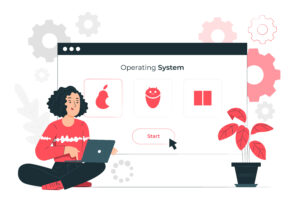SAP, which stands for Systems, Applications, and Products in Data Processing, is a multinational software corporation that specializes in enterprise resource planning (ERP) software. SAP software is designed to assist organizations in managing their business operations, ranging from finance and accounting to human resources, supply chain management, and more. It is renowned for its comprehensive suite of integrated applications that enable businesses to streamline their processes, make data-driven decisions, and enhance overall efficiency. In this article, we will delve into the world of SAP, exploring its history, key components, and the critical role it plays in modern business operations.
A Brief History of SAP
The story of SAP began in 1972 when five former IBM employees in Germany founded the company. Their vision was to create software that could standardize and automate business processes, allowing organizations to manage their operations more effectively. The first product they developed was SAP R/1, which marked the beginning of their journey into the world of ERP software.
Over the years, SAP has continued to innovate and expand its product offerings. SAP R/2 and SAP R/3 followed, each introducing new features and capabilities. The release of SAP HANA, an in-memory database platform, in 2010 represented a significant technological advancement, enabling real-time data processing and analytics.
Today, SAP has evolved into a global leader in enterprise software, serving thousands of organizations across diverse industries worldwide. Its software solutions have adapted to meet the ever-changing demands of modern business, making SAP a vital part of the corporate landscape.
What is SAP Software Used For?
SAP software is a comprehensive solution designed to manage and integrate various business processes within an organization. It provides a centralized platform for streamlining core activities such as financial accounting, human resources, procurement, and logistics, ensuring efficiency and consistency across departments. SAP also offers advanced tools for data analysis and visualization, enabling informed decision-making and strategic planning. Additionally, it enhances customer interactions and service delivery, optimizes supply chain operations, and supports effective human resource management. Overall, SAP software facilitates integrated business management, driving operational efficiency and supporting organizational growth.
Critical Components of SAP Software
SAP offers a comprehensive suite of software solutions designed to address diverse business needs across various sectors. Here are some of the essential components and solutions within the SAP ecosystem:
SAP ERP
At the heart of SAP’s offerings is its ERP (Enterprise Resource Planning) software, which integrates multiple business functions into a unified platform. SAP ERP encompasses critical areas such as financial accounting, human resources, procurement, and logistics. By centralizing data and processes, SAP ERP facilitates streamlined management and enhances operational efficiency across the organization.
SAP S/4HANA
Building on the foundation of SAP ERP, SAP S/4HANA represents a significant advancement in SAP’s software solutions. This next-generation ERP suite is powered by the SAP HANA in-memory database, providing real-time analytics and a more streamlined data model. SAP S/4HANA offers a modern user experience with improved performance and capabilities, making it an ideal choice for businesses seeking innovative solutions.
SAP Business Intelligence (BI)
SAP’s Business Intelligence solutions enable organizations to transform data into actionable insights. With tools such as SAP BusinessObjects, SAP Lumira, and SAP Analytics Cloud, businesses can gather, analyze, and visualize data to support informed decision-making. These BI tools help organizations uncover trends, optimize processes, and drive strategic initiatives.
SAP Customer Relationship Management (CRM)
SAP’s CRM solutions are designed to enhance customer interactions and drive growth. They support a range of functions, including sales, marketing, and customer service. By improving customer engagement and relationship management, SAP CRM helps businesses deliver exceptional experiences and build long-term customer loyalty.
SAP Supply Chain Management (SCM)
The SAP SCM suite assists organizations in optimizing their supply chain operations. It covers various aspects from demand planning and procurement to production and logistics management. By improving supply chain efficiency, SAP SCM helps businesses reduce costs and improve service levels.
SAP Human Capital Management (HCM)
SAP HCM provides a comprehensive approach to managing human resources. It includes functionalities for payroll, talent management, and workforce planning. SAP HCM supports organizations in attracting, developing, and retaining talent, which is critical for driving organizational success.
SAP Industry Solutions
SAP offers specialized solutions tailored to specific industries, such as retail, manufacturing, healthcare, and utilities. These industry-specific solutions address unique challenges and compliance requirements, providing targeted support and functionality.
SAP Cloud Platform
The SAP Cloud Platform serves as a versatile foundation for developing and deploying applications. It supports the integration and extension of existing SAP solutions, fostering innovation, scalability, and flexibility in the cloud.
These components collectively represent SAP’s extensive capabilities in supporting various business functions and industries, driving efficiency and growth through integrated and innovative solutions.
The Impact of SAP Software on Businesses
The implementation of SAP offers transformative benefits for businesses across various sectors and sizes. Its robust suite of tools and solutions provides a range of advantages that enhance organizational performance and strategic capabilities:
Efficiency and Productivity
SAP software significantly improves operational efficiency by automating routine tasks and streamlining business processes. By reducing manual intervention, SAP minimizes errors and accelerates workflows. This automation not only speeds up day-to-day operations but also frees up valuable time for employees to focus on higher-value activities, thereby boosting overall productivity.
Real-time Insights
One of SAP’s standout features is its use of in-memory computing technology. This capability allows businesses to access and analyze data in real-time, which is crucial for rapid decision-making and agile planning. With real-time insights, companies can respond more swiftly to market changes, identify trends, and make informed decisions based on the latest information.
Improved Customer Experiences
SAP’s Customer Relationship Management (CRM) solutions are designed to enhance how businesses interact with their customers. These tools enable organizations to deliver more personalized and responsive service, improving customer satisfaction and loyalty. By leveraging customer data effectively, businesses can tailor their interactions and offerings to meet individual needs, fostering stronger customer relationships.
Cost Control
SAP contributes to significant cost savings by optimizing processes and better-allocating resources. Through improved efficiency and reduced operational redundancies, organizations can lower their expenses and maximize the return on investment. The ability to streamline operations and manage resources effectively leads to a more cost-efficient business model.
Scalability
Scalability is a key advantage of SAP solutions. Whether a small business aiming to expand or a large enterprise managing intricate operations, SAP software can grow with the organization. Its flexible architecture supports the evolving needs of businesses, allowing them to scale their operations seamlessly and adapt to changing demands.
Compliance and Security
Maintaining compliance with regulatory requirements and ensuring data security is critical for any organization. SAP provides comprehensive tools to help businesses meet legal and industry standards while safeguarding sensitive information. With built-in security features and compliance management, SAP helps protect data integrity and support regulatory adherence.
Hence, SAP software delivers substantial benefits by enhancing efficiency, providing real-time insights, improving customer experiences, controlling costs, offering scalability, and ensuring compliance and security. These advantages collectively drive better business outcomes and support organizational growth and resilience.
Conclusion
In conclusion, SAP software has played a pivotal role in transforming the way organizations manage their operations and make decisions. Its comprehensive suite of applications, coupled with advanced technologies like SAP HANA, positions it as a leader in the world of enterprise software. As businesses continue to evolve, SAP’s commitment to innovation ensures that it remains a valuable partner in achieving operational excellence and driving growth.





